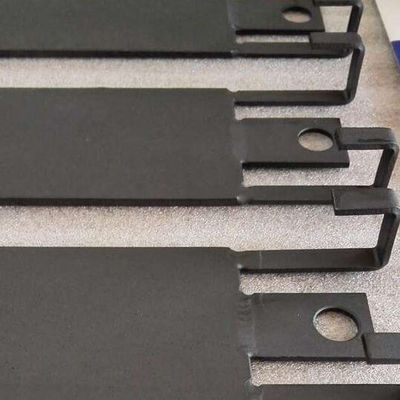-
Titanium Pipe Fittings
-
Titanium Welded Pipe
-
Titanium Pipe Flange
-
Seamless Titanium Tubing
-
Titanium Heat Exchanger
-
Titanium Coil Tubing
-
Titanium Alloy Sheet
-
Titanium Fasteners
-
Titanium Welding Wire
-
Titanium Round Bar
-
Titanium Forgings
-
Titanium Clad Copper
-
Titanium Electrode
-
Metal Sputtering Target
-
Zirconium Products
-
Sintered Porous Filter
-
Shape Memory Nitinol Wire
-
Niobium Products
-
Tungsten Products
-
Molybdenum Products
-
Tantalum Products
-
Equipment Products
-
Aluminum Products
-
Stainless Steel Products
MMO Coated Titanium Electrode Anode For Electrodialysis Desalinate Seawater
| Grade | Gr1, Titanium, Gr1 Ti As Substrate, Mixed Ir-Ta As Coating | Ti Content (%) | 99.6% |
|---|---|---|---|
| Powder Or Not | Not Powder | Technique | Sand Blasting, Brush Coating, Electrolytic Organic, Acid Washing, CNC Machining |
| Application | Industry, Recovery Of Electrode, Anodes For Cathodic Protection Cathodic Protection, Disinfection In Hospital, Water Treatments | Dimensions | As Per Customer's Design, 100*100mm |
| Material | TI Gr1+MMO, Titanium | Standard | ASTM Standard B265 Grade1, ASTM Standard B348 |
| Coating | Rutheium Iridium Oxide, Customer's Requirements, Mixed Ruthenium-Iridium Oxide Or Platinum As Coating | ||
| Highlight | Titanium Electrodes For Electrolysis,MMO Titanium Electrode Anode,Desalinate Seawater MMO Electrode |
||
Spec.
| Electrode type |
plate electrodes (not meshed) |
| Substrate | Titanium Gr.1 /pure titanium |
| Model | CS- Anode |
| Size | Customized |
| Application | Water treatment |
Practical case (from Belgian customer)
The application will be an electro-dialysis reversal stack to desalinate seawater
Electrode type: plate electrodes (not meshed),
Material: ruthenium or iridium MMO coated titanium, only a single side.
Thickness: 1.5 mm
Current density: 300A/m²
Design as on the attached technical drawings.
Extra information:
Composition of the electrolyte: NaSO4 0.1M
Temperature of the electrolyte: 3-25°C
Amperes: 105A max total 35A/ electrode
Operation time: 22/7
Product details
1. Plate base material: Gr.1
2. Plate coating: ruthenium series, and adding rare and precious metals to maximize the activation of the coating
3. Process: The coating is configured in strict accordance with the confidential formula, brushed, dried and sintered in a certain order. After brushing, the sampling is strictly tested according to the anode rapid life measurement method to ensure the normal operation of the electrode plate under harsh conditions.
4. In order to ensure the safety of operation and prevent the terminal from being corroded by the material liquid, the terminal is made of titanium-clad copper, which has good electrical conductivity, safety and reliability.
5. Specifications: The size can be customized according to the actual situation of the electrodialyser.
6. The anode can be designed to be reversed, which can automatically clean the dirt formed on the surface of the ion exchange membrane and the electrode, and improve the operating current of the electrodialysis and the recovery rate of water. At the same time, it also has lower overpotential, has power saving performance, and has a longer service life than ordinary ruthenium-iridium-coated metal anodes.
The principle of electrodialysis desalination:
Desalination of seawater by electrodialysis is achieved through electrodialysis desalinators. Specifically, under the action of an external DC electric field, when the raw water containing salt flows through the compartment composed of anion and cation exchange membranes and separators, the anions and cations in the water begin to move directionally, the anions migrate to the anode direction, and the cations migrate to the cathode direction. Due to the selective permeability of the ion exchange membrane, the fixed exchange group of the cation exchange membrane (referred to as the cation membrane) is negatively charged, so it allows the cations in the water to pass through and blocks the anions. The fixed exchange group of the anion exchange membrane (anion membrane for short) is positively charged, therefore, the anions in the water are allowed to pass through and the cations are blocked, causing the ions in the fresh water compartment to migrate to the concentrated water compartment, so as to achieve the purpose of desalination.
Application range:
Electrodialysis devices have been widely used in electric power, chemical industry, electronics, environmental protection, medicine, textile, food and other industries, and have achieved satisfactory economic benefits. The specific uses are:
1) Desalination of seawater and brackish water to produce drinking water.
2) Preparation of beverage water such as beer, soda, purified water, etc.
3) Preparation of low-pressure boiler water.
4) Electrodialysis and ion exchange are combined to produce distilled water, high-purity water and ultra-pure water. This water-making method can save 80-90% of acid and alkali, avoid frequent regeneration of resin, and greatly reduce the cost of water production.
5) Combined with other different processing units, it can be used to make water for industries such as electronics, medicine, food, and chemical industry.
6) Au, Ag, Cu and other precious metals in industrial wastewater (liquid) such as electroplating and electronics
![]()




